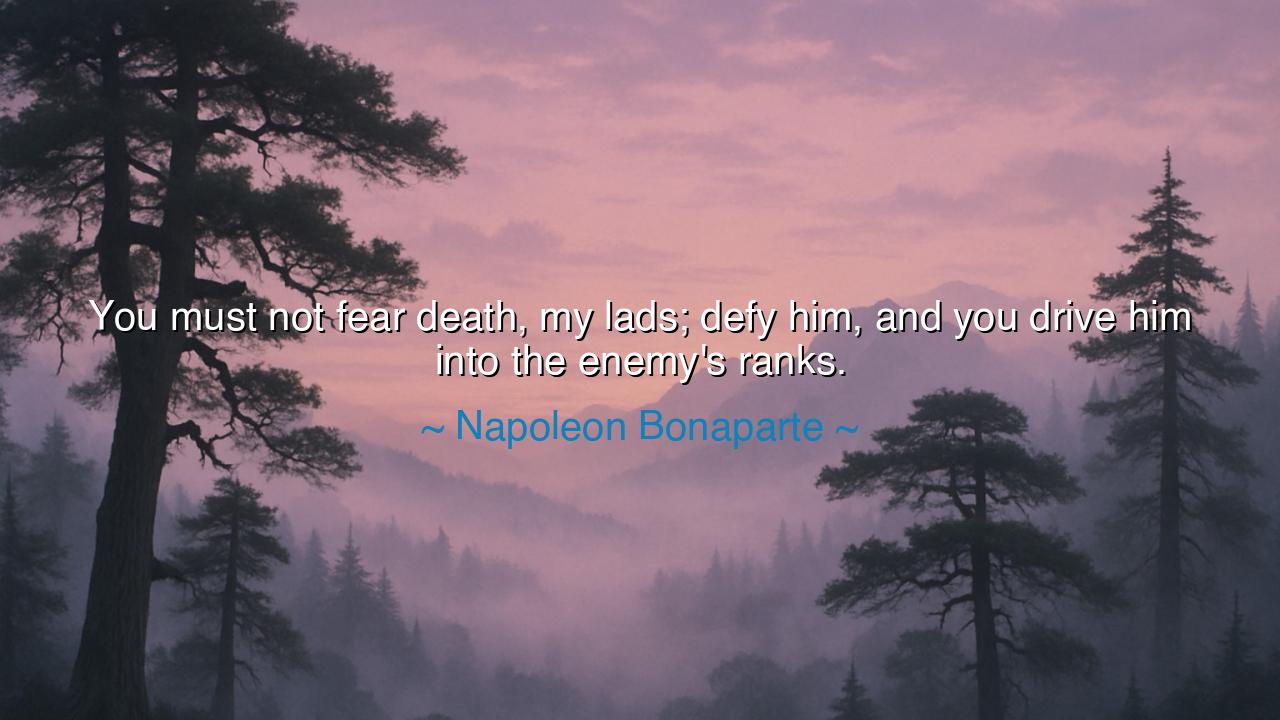
You must not fear death, my lads; defy him, and you drive him






"You must not fear death, my lads; defy him, and you drive him into the enemy's ranks." — thus spoke Napoleon Bonaparte, the iron soul of France and the architect of empires. In these fiery words lies the spirit of a commander who saw in courage the highest virtue and in fear the surest path to ruin. For death, to Napoleon, was not merely the end of life, but the shadow that haunts the hesitant. To defy death was to master it — to seize the strength that only the fearless can wield. His command was not merely for soldiers on the field, but for every soul that must one day face the terror of uncertainty.
The meaning of this quote is both martial and eternal. It teaches that fear itself is the enemy — that those who tremble before danger have already surrendered to it. In the battlefield of life, as in war, hesitation feeds defeat. Death, whether literal or symbolic, draws near to the timid but retreats from the bold. To stand firm, to advance despite dread, is to command the very forces that threaten to destroy you. For when you show no fear, you disarm fate itself. Napoleon’s words carry not the arrogance of defiance, but the wisdom of resolve — the understanding that courage creates its own protection.
These words were born in an age of thunder and blood. Napoleon often addressed his troops before battle with the fervor of a prophet, knowing that men do not fight with muscle alone, but with spirit. To inspire courage was to win half the victory before the first cannon fired. He had seen armies falter because of fear — men who, though well-armed, perished because their hearts yielded before their swords did. But when he spoke of defying death, he gave his soldiers a shield no metal could forge: belief. Belief that destiny favored the brave, that fortune smiled upon those who advanced without trembling.
There is a moment in the Battle of Austerlitz, the “Battle of the Three Emperors,” that embodies this truth. As mist cloaked the field, Napoleon’s troops waited against superior numbers. Many were weary, some afraid. Yet their emperor rode among them, his voice calm, his eyes bright with fire. “The enemy believes we retreat,” he said, “but today, we strike like thunder.” And so they did. With fearless precision they broke through the allied line, routing the combined might of Russia and Austria. The victory was not only of strategy but of spirit — of men who defied death and, in doing so, turned it upon their foes.
But beyond the battlefield, Napoleon’s command speaks to every human endeavor. Each of us must face our own “enemy’s ranks” — moments of trial, loss, and fear that threaten to undo us. The fear of failure, the fear of rejection, the fear of mortality — these are our invisible deaths. When we shrink before them, they overtake us; when we rise and face them, they retreat. To live well, then, is to live defiantly — not recklessly, but with the quiet courage of one who refuses to be ruled by fear.
The ancients knew this truth long before Napoleon’s cannons roared. The Spartan mothers, sending their sons to war, would hand them their shields and say, “Return with it — or on it.” For to them, honor conquered death; courage was the soul’s true armor. So too did the Stoic philosophers teach that death is not to be feared, for it comes to all; only disgrace and cowardice stain eternity. Napoleon’s words, though born of the battlefield, echo these timeless truths. To defy death is not merely to survive; it is to live fully, consciously, without surrendering the will to fear.
Let this be your lesson, O listener: do not let fear command you. Whatever battle lies before you — whether it is hardship, doubt, or grief — meet it with the composure of the soldier who knows that panic is the true enemy. Stand tall when the storm rises. Advance, even when your knees tremble. For the moment you defy fear, you drive it back into the shadows, and you claim mastery over your fate.
In the end, death will come for all, but not all will truly live. The one who fears dies a thousand times; the one who dares, only once. Thus, take courage — in your struggles, in your hopes, in your living. Be as Napoleon’s soldiers were at Austerlitz: steadfast, unyielding, alive with purpose. For when you defy death, in battle or in life, you do not merely survive — you conquer.






AAdministratorAdministrator
Welcome, honored guests. Please leave a comment, we will respond soon